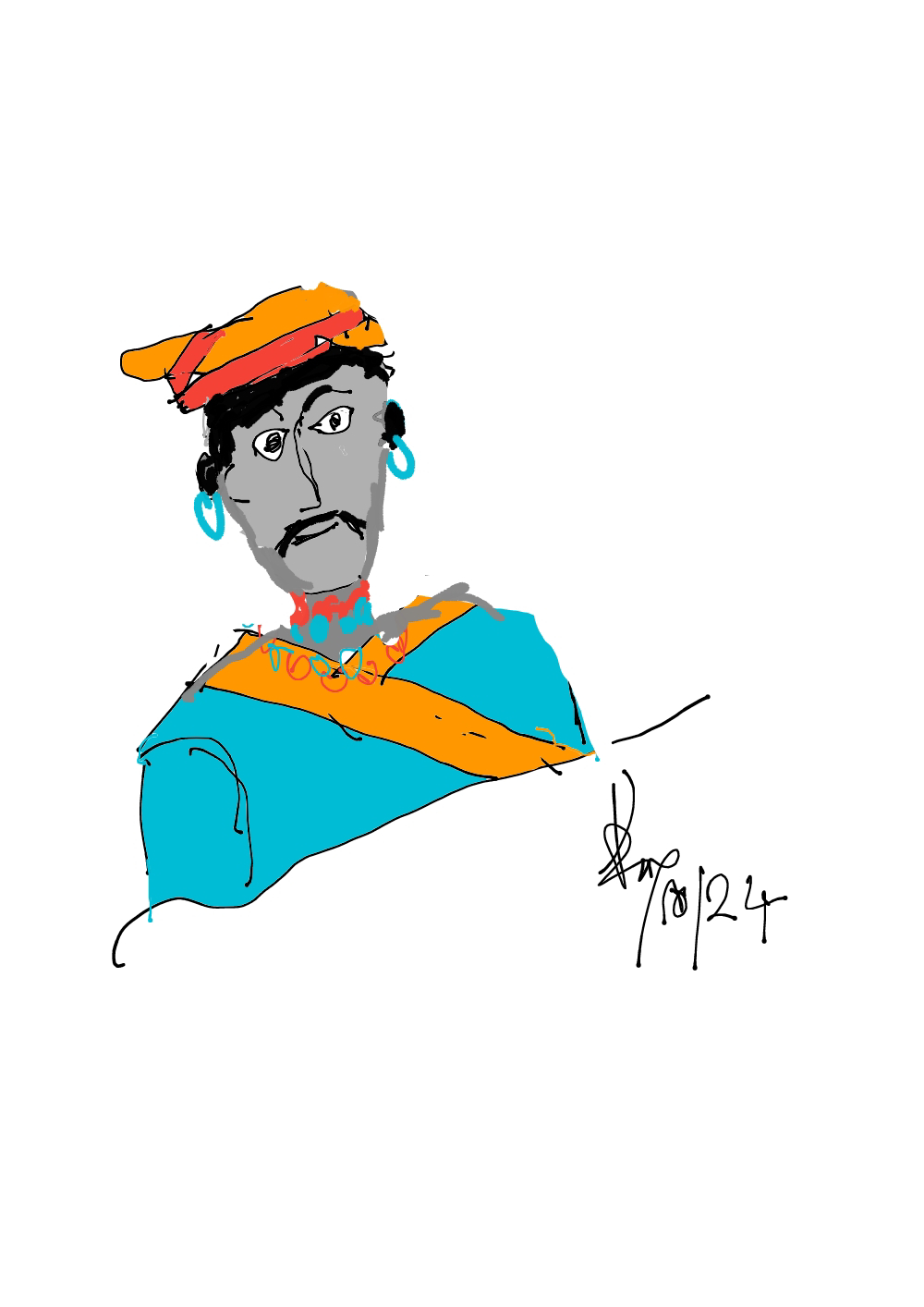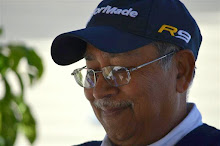In the quaint village of Tikawan, near Kalpi, a young Mahabir grew up with an insatiable curiosity and a sharp mind. His Braja Bhasa teacher, Panditji, marveled at Mahabir's quick grasp of languages and mathematics. The villagers soon recognized the clever boy's talent for trouble-shooting.
One day, the local oil presser, Lala, complained about thieves stealing his precious mustard oil. Mahabir, then just 12, offered to help. He observed the presser's daily routine, analyzed the theft patterns, and set a trap. The thieves were caught, and Lala's gratitude earned Mahabir the nickname "Chatur" (clever one).
Mahabir's mathematical skills also helped expose the village grocer's deceitful practices. The grocer would mix stone particles with rice to increase his profits. Mahabir calculated the discrepancy in weights and measurements, revealing the scam. The villagers applauded his ingenuity.
As Mahabir grew older, his reputation spread. Village elders sought his counsel to resolve disputes. He learned Persian from local mullahs, broadening his linguistic skills.
Years passed, and Mahabir's exceptional abilities caught the attention of Emperor Akbar's courtiers. Summoned to Agra, Mahabir became Birbal, one of the Navaratnas.
My childhood friend Pushkar, a descendant of Khubchand, would often regale me with tales of Birbal's exploits during our school days. He spoke of how Birbal's cleverness had earned him a place in Akbar's court and how Khubchand had supplied firewood, tallow, and other essentials to the Mughal soldiers.
As the Mughal army marched from Agra to Jodhpur, Khubchand joined the entourage. The grand procession was a sight to behold:
At the forefront, horse riders led the way, clearing the path and securing the surroundings. Behind them, Akbar himself rode atop a majestic elephant, a symbol of his power and authority. Following closely were his trusted Navaratnas, including Birbal, Tansen, and Abul Fazl, each mounted on elephants.
Next in line were the foot soldiers, armed with swords, spears, and dhal (shields). These brave warriors formed the backbone of the Mughal army. Make-shift kaccha roads were built to facilitate their passage, as established roads were scarce.
Akbar's chief strategist, Man Singh, planned the army's movements, wisely advising against marching during the scorching hot sun. Day journeys with restful nights ensured the army remained fresh and alert.
When the soldiers pitched their tents, merchants would set up a bustling market at a distance. The aroma of roasted meats, freshly baked bread, and spices wafted through the air, enticing soldiers and local villagers. This impromptu marketplace transformed into a vibrant Mela, with villagers and soldiers mingling freely.
Birbal's presence ensured peace and harmony, as he mediated disputes and maintained order. Akbar, pleased with the cordial atmosphere, would sometimes invite Tansen to perform. Tansen's soulful renditions of various ragas would mesmerize the emperor, soldiers, and villagers.
One evening, Akbar asked Birbal, "What is the difference between a wise man and a fool?" Birbal replied, "A wise man learns from others' mistakes, while a fool learns from his own." Akbar smiled, acknowledging Birbal's insightful answer.
On another occasion, Akbar asked Birbal to find the cleverest man in the kingdom. Birbal returned with a humble farmer who had wisely divided his land among his quarrelsome sons, stipulating that each son must cultivate the land together, ensuring unity.
Akbar was impressed by Birbal's choice and asked how he had selected the farmer. Birbal explained that the farmer's innovative solution demonstrated wisdom and understanding of human nature.
During their journey, Akbar once asked Birbal four questions:
1. What is the most valuable thing in the world?
2. What is the fastest thing in the world?
3. What is the biggest thing in the world?
4. What is the most numerous thing in the world?
Birbal replied:
1. The most valuable thing is knowledge.
2. The fastest thing is the mind.
3. The biggest thing is the universe.
4. The most numerous thing is stupidity.
Akbar was delighted with Birbal's thoughtful answers.
Another time, Akbar asked Birbal to find a solution for the kingdom's water scarcity. Birbal suggested building small check dams to conserve rainwater and harvest dew. Akbar implemented the plan, alleviating the water crisis.
When Akbar asked Birbal, "What should a king do when his people are unhappy?" Birbal replied, "He should either change his policies or change his people." Akbar appreciated Birbal's candid advice.
As the Mughal army approached Jodhpur, Birbal reflected on his journey from Tikawan to the imperial court. His childhood experiences had prepared him for the complexities of statecraft.
Decades later, Pushkar, now a cunning lawyer, would exploit our ancestral connections for personal gain, gobbling up a portion of our ancestral house in Allahabad. I couldn't help but contrast Pushkar's deceitful nature with the integrity of Birbal, the clever boy from Tikawan.
Years passed, and Birbal's legend grew. His wit and wisdom became synonymous with justice and fairness. Akbar's court was transformed by Birbal's presence, and the emperor's reign was marked by unprecedented peace and prosperity.
One day, as Birbal prepared to leave Akbar's court, the emperor approached him with tears in his eyes. "Birbal, my friend and advisor, what can I gift you for your years of service?" Birbal smiled, "Your Majesty, my reward lies in the smiles of the people, the prosperity of the kingdom, and the memories we've shared."
Akbar nodded, understanding Birbal's humility. "Then, let me build a monument in your honor, where future generations will remember your wisdom and wit." Birbal declined, "No, Your Majesty, my legacy lies in the hearts of the people, not in stone or marble."
And so, Birbal returned to Tikawan, his village, where he spent his final days surrounded by loved ones, sharing tales of his adventures and imparting wisdom to the next generation.
The story of Birbal serves as a reminder that true greatness lies not in wealth or power but in the positive impact we have on others' lives.
Epilogue:
I sat with Pushkar, now an old man, reminiscing about our childhood days. He looked at me with a tinge of regret, "I wish I had followed Birbal's path, my friend." I smiled, "It's never too late, Pushkar. Share Birbal's stories with your grandchildren, and perhaps they'll learn from his wisdom."
As I left Allahabad, I couldn't help but wonder: what if Pushkar had followed Birbal's example? Perhaps our ancestral house would still be intact, and Pushkar's legacy would be one of integrity, not deceit.
But Birbal's story remains, a beacon of hope, inspiring generations to come.
I have twisted the history about end of Birbal,he was assassinated by jealous courtiers of Akbar as per some historians. As the historians were not present during that period of 16th century so they used circumstantial evidences from various Urdu and Hindi manuscripts to conclude, hence I used my imagination to give a happy ending.
---


10 comments:
A new story from an old era, beautifully narrated with an engrossing growing up of Mahabir, his induction in the Mughal Court and his subsequent interactions.... Enjoyed...
Gem of a story! What an ending and an epilogue! Made my Mahashtami day. Thank you Sir 🙏
Thanks dear,yes I delved in history and interpreted in my way !
Thanks Sabyasachi for liking the story!
Beautiful narration. Shuvo astami.
Thanks Sukhen,Shuvo Nabami!
Wonderful summation and narration of birbal's intelligence, knowledge and experience in dealing with complex situations in your same witty style in an interesting way. Kind regards
Thanks dear Vijay for your comment!
Awesome Story, brimmed with life lessons...My takeaways:
1) Troubleshoters are always & everywhere valued.
2) Humility and social service are of utmost importance in life. Physical prosperity fades away with time.
Thanks for the awesome piece of writing.
Thanks dear Sorabh for your comment,yes lot to learn from Birbal !
Post a Comment